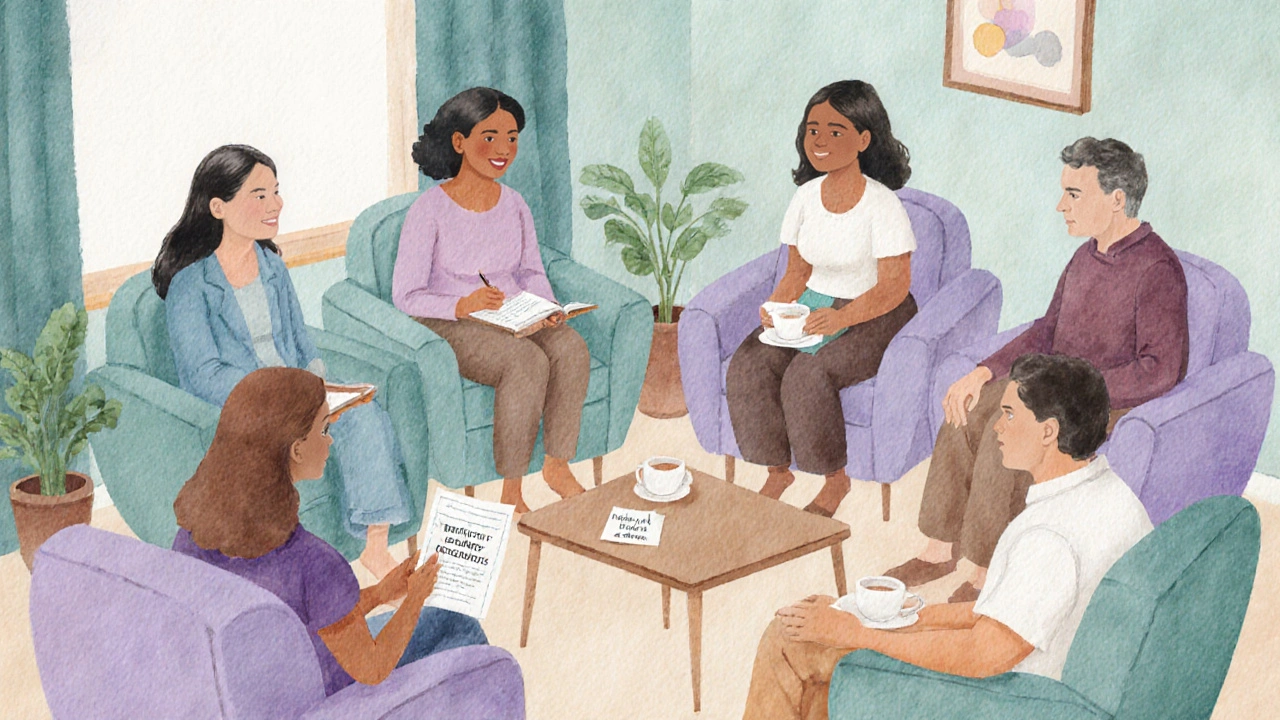When infertility is defined as the inability to conceive after a year of regular, unprotected intercourse, its reach goes far beyond the medical realm. It reshapes how people see their bodies, how they value themselves, and how they interact with the world.
Why Infertility Touches Body Image
Body Image is a person's subjective perception of their physical appearance, and it is tightly linked to the cultural script that says a healthy body should reproduce. When that script is challenged, many experience a sudden disconnect between how they look and how they feel they should look.
- Medical interventions - Hormonal treatments, IVF cycles, and surgery can cause weight fluctuations, bloating, or changes in skin condition, directly altering visual self‑assessment.
- Social comparison - Seeing peers celebrate pregnancies on social media can amplify feelings of inadequacy, turning a normal body into a perceived failure.
- Age pressure - Women and men in their late 20s to early 40s often encounter external deadlines (“the clock is ticking”), making any physical sign of infertility feel like a personal flaw.
These pressures can create a feedback loop: negative thoughts about the body fuel anxiety, which in turn intensifies hormonal imbalances, further affecting appearance.
Self‑Esteem Under Strain
Self‑Esteem refers to the overall value one places on oneself and how worthy they feel in various life domains. Infertility attacks this sense of worth by attaching personal identity to reproductive success.
- Identity loss - Many people internalize the role of "future parent" early on; when conception doesn’t happen, that identity feels stripped away.
- Relationship tension - Couples often report reduced intimacy, blame, or fear of judgment, which chips away at confidence.
- Stigma - Cultural stigma surrounding infertility can make individuals hide their struggle, preventing them from receiving support that would boost self‑esteem.
The combination of these factors can push self‑esteem scores down to levels comparable with clinical depression, according to a 2023 longitudinal study of 1,200 couples across Australia and the UK.
Psychological Consequences and When to Seek Help
While occasional sadness is normal, persistent feelings of shame, hopelessness, or body‑related anxiety indicate a deeper issue.
- Persistent negative self‑talk - "I'm defective" or "My body has failed" repeated for weeks.
- Social withdrawal - Avoiding gatherings where children are present or refusing intimacy.
- Physical symptoms - Sleep disturbances, appetite changes, or unexplained tension headaches.
When two or more of these signs appear, consulting a Mental Health Professional who specializes in reproductive psychology can prevent escalation.
Effective Coping Strategies
Below is a quick‑reference table that outlines practical steps, what they target, and simple ways to start.
| Strategy | Primary Target | How to Begin |
|---|---|---|
| Mindful Body Appreciation | Negative body perception | Spend 5 minutes daily noting three body parts you appreciate, unrelated to fertility. |
| Couples Communication Ritual | Relationship tension | Set a weekly 15‑minute “check‑in” without medical talk - focus on emotions and needs. |
| Support Group Participation | Isolation & stigma | Join a local infertility support group (e.g., Fertility Support Sydney) or an online forum with moderated peer discussions. |
| Professional Counseling | Deep‑seated self‑esteem loss | Schedule an initial session with a therapist trained in cognitive‑behavioral therapy for reproductive issues. |
| Limit Social Media Exposure | Social comparison | Use app blockers for 30‑minute periods after work; replace scrolling with a hobby you enjoy. |

Medical Treatments and Their Psychological Footprint
Modern reproductive medicine offers several options, each with its own emotional side‑effects.
- IVF (In‑vitro fertilization) involves hormonal stimulation, egg retrieval, and embryo transfer. The hormone injections can cause mood swings and body‑image concerns due to bloating and weight gain.
- Hormonal Treatment (e.g., Clomiphene, Letrozole) alters estrogen and progesterone levels, sometimes leading to acne, hair loss, or emotional volatility.
- Surgical Intervention such as laparoscopy for endometriosis can leave visible scars, which may affect self‑image until properly processed.
Understanding these side‑effects helps patients anticipate emotional dips and plan coping tactics ahead of time.
Building a Supportive Environment
Beyond personal coping, the surrounding environment plays a pivotal role.
- Partner Allies - When partners openly acknowledge the emotional toll, the affected person feels validated. Simple gestures like a hug after a failed cycle can boost self‑worth.
- Family Education - Informing close relatives about the psychological impact reduces unsolicited advice that often feels judgmental.
- Workplace Sensitivity - Employers who provide flexible leave for appointments alleviate stress, indirectly protecting self‑esteem.
Real‑World Stories
Emma, a 35‑year‑old teacher from Sydney, describes her journey: “After three IVF cycles, my stomach was constantly swollen, and I stopped looking at myself in the mirror. I felt like a ‘failed womb.’ Joining a local support group let me hear other women say, ‘Your worth isn’t measured by a pregnancy.’ That shifted my inner dialogue.”
Mark, a 40‑year‑old accountant, shares: “I stopped going to the gym because I thought my body was ‘broken.’ My therapist introduced the idea of ‘functional appreciation’ - focusing on what my body can do, like hiking with my kids. That changed how I relate to my physique.”
These narratives illustrate that while infertility can erode confidence, intentional strategies and community help rebuild it.

Quick Checklist for Daily Self‑Care
- Start the day with a positive body affirmation.
- Schedule a 10‑minute “emotion check‑in” with your partner.
- Limit one social media session per day; mute pregnancy‑related keywords.
- Reach out to a support group or therapist at least once a week.
- Track mood changes in a journal, noting any treatment‑related triggers.
When to Seek Professional Help
If you notice any of the following, it’s a signal to consult a specialist:
- Persistent feelings of worthlessness lasting more than two weeks.
- Escalating anxiety that interferes with daily tasks.
- Any thoughts of self‑harm or hopelessness.
Early intervention with a Mental Health Professional can prevent long‑term damage and restore a healthier self‑view.
Frequently Asked Questions
Can infertility affect my partner’s self‑esteem as well?
Absolutely. Men often tie their masculine identity to fertility, so a diagnosis can trigger feelings of inadequacy, performance anxiety, and lowered confidence. Open communication and joint counseling are key.
What role does social media play in worsening body image during infertility?
Social platforms showcase idealized pregnancies and “baby bumps,” creating unrealistic standards. Constant exposure can magnify the gap between your reality and what you see online, deepening shame.
Are there specific therapies that work well for infertility‑related self‑esteem issues?
Cognitive‑behavioral therapy (CBT) targets negative thought patterns, while acceptance‑and‑commitment therapy (ACT) helps patients accept the infertility reality without judging themselves. Both have shown significant improvements in self‑esteem scores.
How can I support my partner who is struggling with body image after fertility treatments?
Listen without trying to fix, validate their feelings, and encourage joint activities that focus on health rather than appearance. Suggest professional counseling if distress persists.
Is it normal to feel relieved after deciding not to pursue further fertility treatment?
Yes. Choosing to stop treatment can remove the constant pressure and allow space to rebuild identity beyond parenthood, often leading to improved self‑esteem and body acceptance.

Michelle Dela Merced
October 12, 2025 AT 17:34I feel you, this hits hard 😢🇺🇸
Mark Conner
October 26, 2025 AT 13:54Reading about the endless cycle of self‑doubt and hormone swings feels like a punch to the gut, especially when society keeps waving the "family" flag like a badge of honor. It’s wild how quickly we internalize those expectations and start measuring our worth in baby bumps. The article nails that pressure, and it’s a reminder that we need to push back against the narrative that fertility defines masculinity or femininity.
Charu Gupta
November 9, 2025 AT 11:14In light of the presented data, it is imperative to acknowledge that the psychosocial ramifications of infertility extend beyond mere physical discomfort. Scholarly literature consistently demonstrates a statistically significant correlation between reproductive challenges and diminished self‑esteem. Accordingly, multidisciplinary intervention-encompassing both medical and psychotherapeutic modalities-should be advocated as a standard of care. 😊
Carl Boel
November 23, 2025 AT 08:34The discourse surrounding infertility must incorporate a lexicon of systemic variables; neglecting the sociocultural determinants reduces the dialogue to a myopic biomedical silo. When treatment protocols are disseminated without addressing the etiological heterogeneity-be it endocrine dysregulation, tubal pathology, or iatrogenic sequelae-the resultant moral hazard perpetuates stigma. Consequently, practitioners bear an ethical imperative to integrate holistic frameworks that mitigate the epistemic injustice inflicted upon patients.
Shuvam Roy
December 7, 2025 AT 05:54It can be overwhelming to navigate the emotional terrain that accompanies fertility treatments, but remember that you are not alone in this journey. Taking moments each day to check in with your feelings and sharing them with a trusted partner can foster resilience. If you ever need a listening ear or a gentle reminder to prioritize self‑care, know that support is always available.
Jane Grimm
December 21, 2025 AT 03:14While the article offers a commendable overview, it glosses over the nuanced interplay between socioeconomic status and access to comprehensive mental health resources. The persuasive yet flamboyant language masks a glaring omission: the systemic barriers that disenfranchise many hopeful parents. A more rigorous exposition would have examined how insurance disparities exacerbate feelings of inadequacy, thereby perpetuating a cycle of marginalization.
Nora Russell
January 4, 2026 AT 00:34One must critically evaluate the methodological underpinnings of the cited longitudinal study. The sample composition lacks diversity, and the operationalization of "self‑esteem" appears conflated with depressive symptomatology, rendering the conclusions somewhat tenuous. A sophisticated analysis would delineate these constructs and address potential confounders, thereby strengthening the evidentiary base.
Craig Stephenson
January 17, 2026 AT 21:54Great points raised here! I think adding a simple daily gratitude practice can help shift focus away from the relentless comparison trap. Even a brief note about something you appreciate about your body-like its strength or endurance-can build a healthier internal dialogue over time.
Eve Perron
January 31, 2026 AT 19:14When contemplating the intricate relationship between infertility and self‑perception, it becomes evident that the societal script, which venerates reproductive capability as the apex of personal achievement, exerts a profound psychological toll; moreover, the cascade of hormonal fluctuations induced by treatment regimens frequently precipitates unanticipated somatic changes, thereby engendering a discordant self‑image that is difficult to reconcile. The pervasive exposure to curated narratives of triumphant pregnancies on digital platforms further entrenches a comparative mindset, amplifying feelings of inadequacy, while the subtle yet relentless countdown of biological clocks imposes an external chronometer that measures worth in months rather than moments. This confluence of factors, as documented in myriad peer‑reviewed studies, orchestrates a feedback loop wherein anxiety begets physiological alterations, which in turn reinforce the negative self‑evaluation, creating a self‑sustaining vortex of distress. It is paramount, therefore, to adopt a multidimensional coping strategy: first, by instituting mindful body appreciation exercises that redirect attention to functional attributes unrelated to fertility; second, by fostering open, non‑medical dialogue within partnerships to alleviate relational tension; third, by curating one's digital consumption, perhaps through scheduled app blockers, to diminish socially induced comparison; and finally, by seeking professional support from clinicians versed in reproductive psychology, who can offer evidence‑based interventions such as cognitive‑behavioral therapy or acceptance‑and‑commitment therapy. By proactively integrating these measures, individuals can begin to dismantle the internalized stigma, restore a balanced self‑esteem, and cultivate a resilient identity that transcends the narrow confines of parental expectations.
Josephine Bonaparte
February 14, 2026 AT 16:34Hey! I totally get how tough this can be-don’t be hard on yourself. Keep in mind that even if the body feels "broken," it’s still doing amazing things every day. Stay strong, and remember you’ve got a whole community cheering you on!
Meghan Cardwell
February 28, 2026 AT 13:54Building on the comprehensive coping framework outlined earlier, I would emphasize the utility of structured journaling as a therapeutic adjunct. By recording physiological markers-such as mood fluctuations, sleep patterns, and treatment side‑effects-alongside reflective entries on body appreciation, individuals can identify trigger patterns and track progress over time. This data‑driven approach not only empowers patients with actionable insights but also facilitates more nuanced discussions with healthcare providers, ultimately fostering a collaborative, patient‑centered care model.